Obituary: Former Argentine President Carlos Menem
- Published
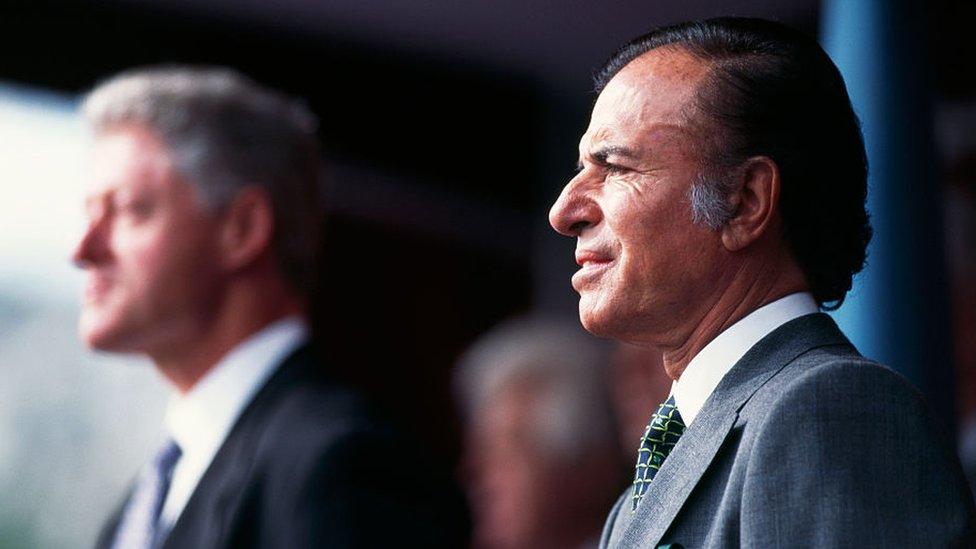
Carlos Menem lived a flamboyant life
Carlos Menem was a politician known for his dashing good looks and extravagant lifestyle.
He was a far cry from the military dictators who had ruled Argentina before its return to democracy in 1983 and a throwback to the glamour of his political hero, Juan Perón.
As Argentina's president between 1989 and 1999, Menem inherited a country traumatised by years of brutal repression, the murder of thousands of dissidents, defeat in the Falklands and the complete destruction of what had been a robust economy.
As a leader, he cultivated the image of a swashbuckling, political "saviour of the nation". He was rarely out of the gossip columns: photographed with glamorous women and expensive cars.
He grew his sideburns long in the style of revolutionary leaders like Simón Bolívar and Santa Anna and was known to dress up for the cameras. He took to the football field alongside Maradona and Argentina's beloved national team, played star player Gabriela Sabatini at tennis and once even scored 13 points in an all-star basketball game on national television.

President Carlos Menem loved to be seen alongside sporting legends such as footballer Diego Maradona
After years of political instability Menem hoped to rescue Argentina from economic abyss, restoring its financial prosperity by seducing it away from isolationism and protectionism.
He opened the country to foreign investment, re-established relations with Britain and shifted its antagonistic relationship with the United States to one of almost unconditional support.
But his administration was battered by financial scandal, rampant corruption, spiralling unemployment and irresponsible borrowing which sowed the seeds for a further, catastrophic economic collapse shortly after he left office.
Menem died on Sunday at the Los Arcos Sanatorium in Palermo. He was 90 years old.
Early life and political awakening
Carlos Saúl Menem was born on 2 July 1930 in Anillaco - a small town in the north west of Argentina.
His parents were both immigrants from Syria. Born a Muslim, he became a Roman Catholic in his youth, but retained strong ties to his parents' homeland.
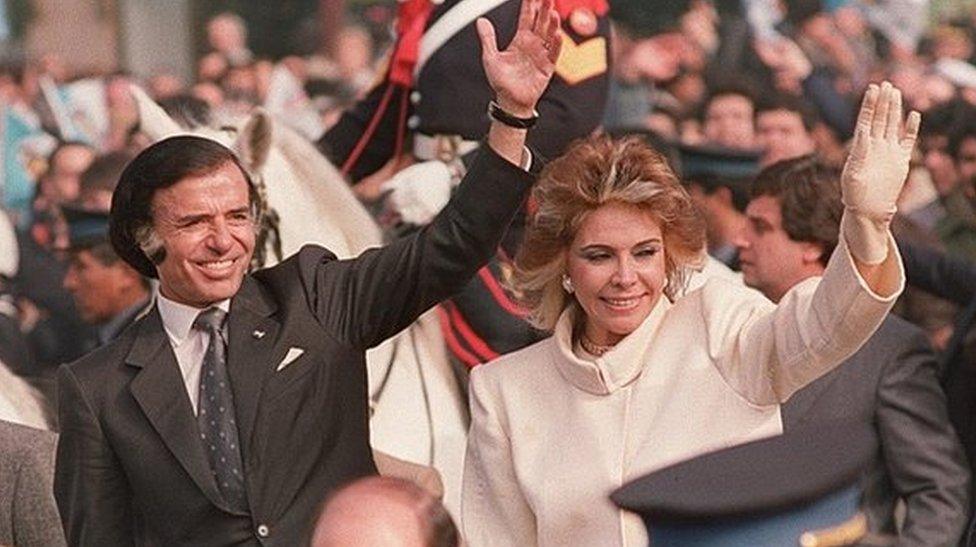
Menem celebrated his 1989 election victory with his first wife, Zulema, by his side
After studying law at the University of Córdoba, Menem became active in the campaign to free political prisoners and was a supporter of the country's former authoritarian president, Juan Perón.
In 1956, the year after Perón was toppled in a military coup, Menem was arrested for attempting to foment violent opposition to the government and was briefly imprisoned. The following year he formed a provincial branch of the Peronist Youth movement.
Menem was elected as the local representative for his region in 1962, but yet another military coup prevented him from taking his seat. He travelled to Spain, where he met the exiled Perón, who gave Menem his blessing and predicted him a great future.
He married Zulema Yoma, a fellow Argentina-born Syrian, whom he met on a visit to the Middle East.
In 1973, he was elected governor of the northern La Rioja province when the ban on Peronism was finally lifted.
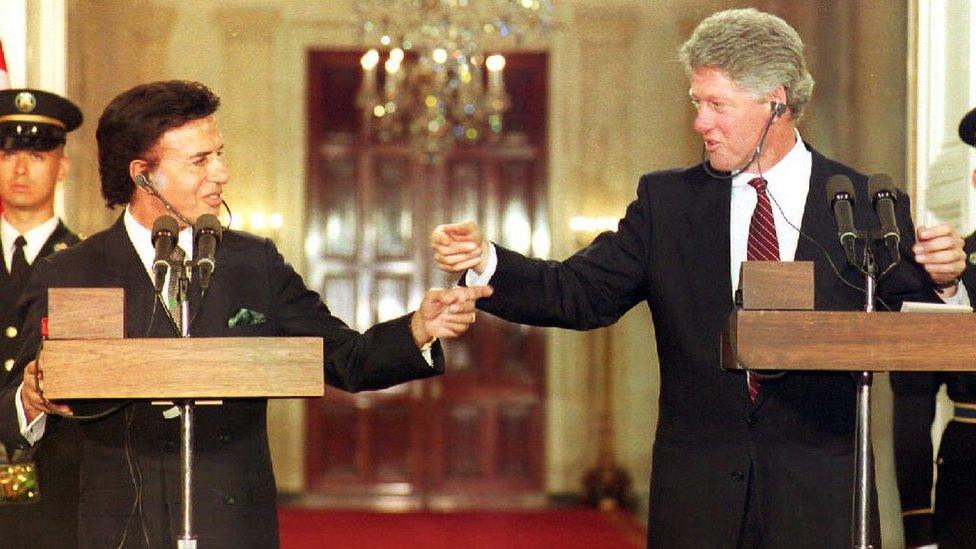
He worked hard to build bridges between Argentina and the United States.
But Argentina's political system was still under immense pressure and, in 1976, the military intervened yet again.
Menem was imprisoned by the military junta, this time for two years - accused of corruption and links with guerrilla movements. He was banished from the capital and restrictions placed on his political involvement until Argentina's defeat in the Falklands and the collapse of the regime of Gen Leopoldo Galtieri.
President
Re-elected to the governorship of La Rioja, Menem became the Peronist Party's candidate for the presidency in 1988 and won the election the following year.
With the country's economy in tatters and the annual rate of inflation running at 5,000%, Menem's government faced a crisis from the start.
He set out to convince the international financial community that he was capable of turning his country's fortunes around. He pegged the peso to the US dollar, privatised public utilities and introduced a more market-based economy - a far cry from Peronism.
Additional foreign investment gave the country a much needed financial boost, reducing inflation and increasing output, but it came at the cost of mass unemployment.
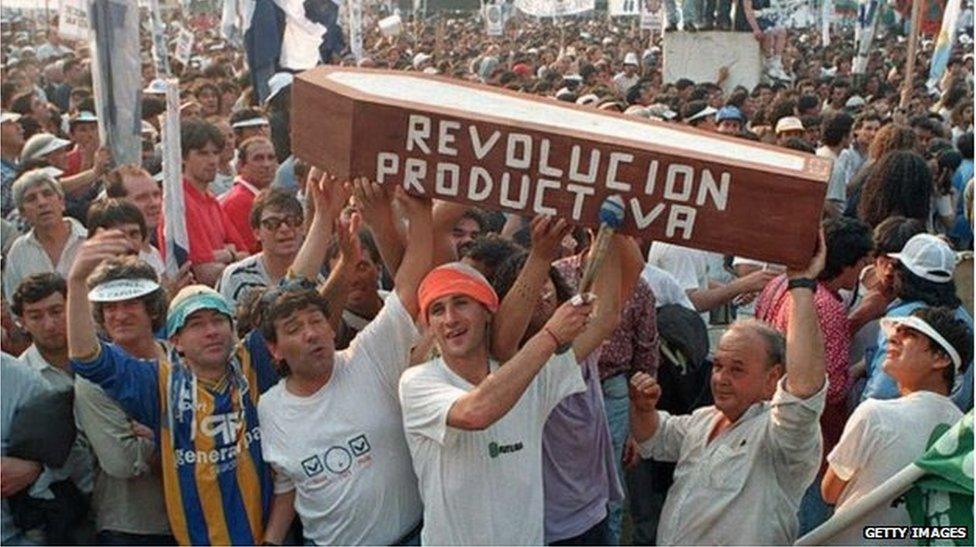
Argentine workers took to the streets to protesting against record unemployment figures in 1995
Even so, Menem was re-elected in 1995 after he had amended the constitution to allow a second presidential term. But the glitz and glamour of the jet-setting, philandering, sports-mad president could not mask increasing problems with the economy.
The policy of pegging the peso to the dollar became increasingly expensive when the US currency was rising in value. In addition, the huge foreign debt incurred in the rush for growth had to be repaid. The inevitable outcome was high interest rates that further weakened Argentina's economic position.
Abroad, he oversaw the re-establishment of diplomatic relations with the UK, visiting Britain in 1998.
He was close to both US President George W Bush and President Bill Clinton. He was invited to address a joint session of the US Congress and helped to found Mercosur, the South American customs union.
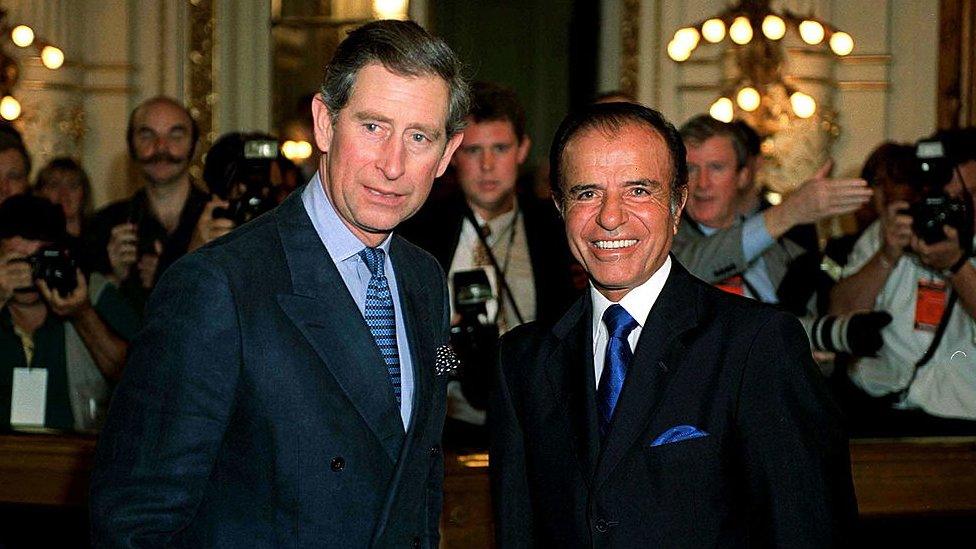
He also oversaw visits of British royalty, including Prince Charles, to Buenos Aires
But the politician who famously entertained Claudia Schiffer and the Rolling Stones at his presidential palace found himself mired in controversy.
Personal and economic scandals
His marriage to Zulema collapsed in spectacular slow motion. There were separations during which she would give interviews agonising about their problems. At one point, he locked her out of the presidential palace after a dramatic public spat. There were reconciliations announced by full page adverts in the newspapers.
Their son, Carlitos, died in a mysterious helicopter accident. Many believed he had been showing off but Zulema furiously insisted it was the result of a murder plot hatched by her husband's aides involved in drugs trafficking.
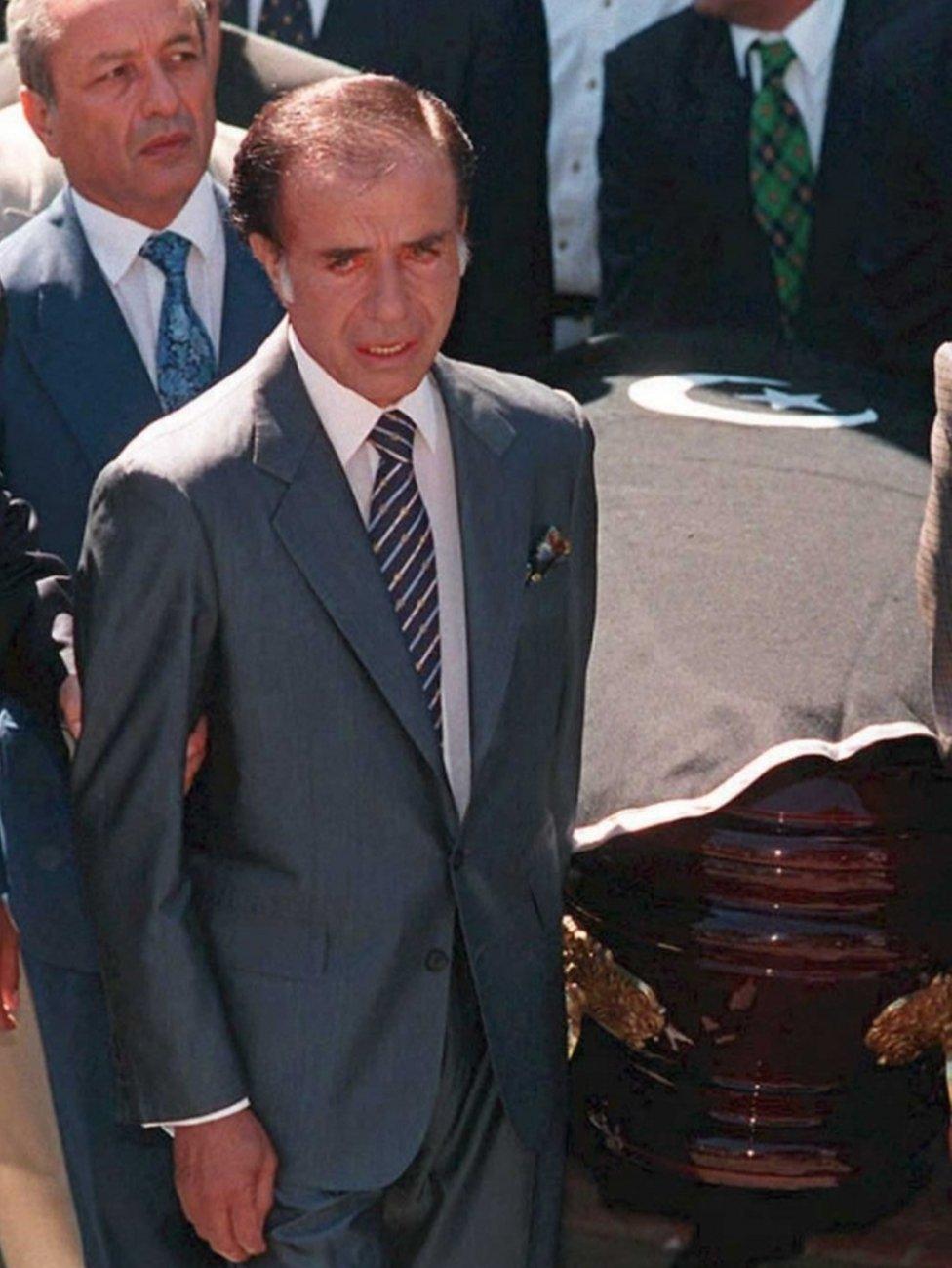
President Menem carried the coffin of his only son, Carlitos, who had died in a mysterious helicopter accident
She hired private detectives who said they found evidence of bullet holes in the wreckage and always maintained the body she had buried was probably not their son's. He had been shot in the head, she claimed and the corpse switched to hide the evidence.
Menem also gained a reputation as a national jinx: some politicians he appointed promptly died and after Argentina's goalkeeper at the 1990 World Cup was ruled out with a knee injury shortly after the leader had patted it.
Corruption charges
Argentina's constitution allows three presidential terms but not if they are served consecutively. Out of office after 10 years, Carlos Menem was not one to fade gracefully from public life.
He divorced Zulema and married the former Miss Universe, Cecilia Bolocco - more than 35 years his junior and a huge TV star in her native Chile.
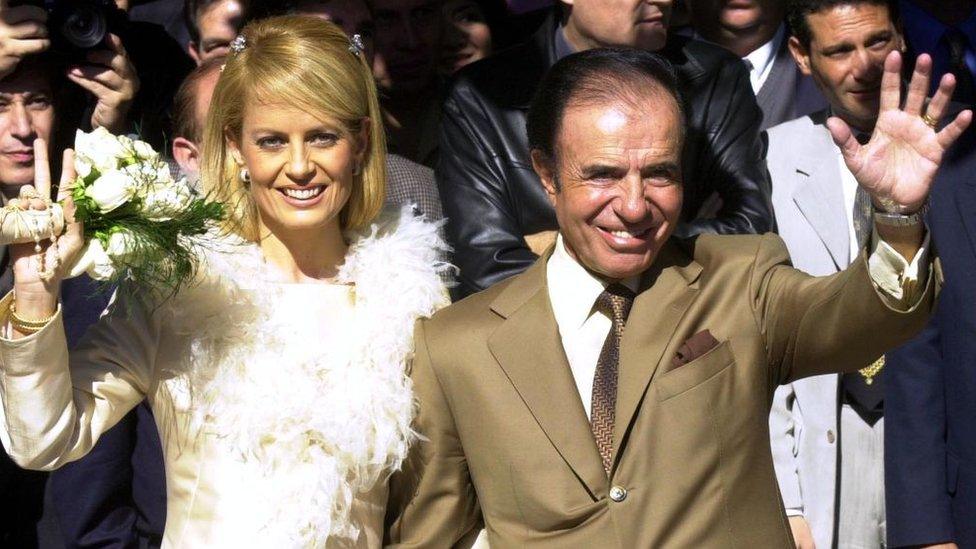
Carlos Menem remarried in 2001
In 2001, Argentina's economy imploded and the government defaulted on its foreign debt. The country, which had enjoyed unprecedented economic growth during his presidency, went from darling of the global banking community to international financial pariah overnight. People lost their savings and took to the streets.
Shortly afterwards, Menem was placed under house arrest, accused of corruption in a scandal involving weapons exports to Ecuador and Croatia while both countries were under international arms embargoes.
The couple moved to Chile in 2002 and had a baby. They returned home when Argentina, which had repeatedly requested his extradition to face corruption charges, cancelled the warrants for his arrest.
Despite the scandal and his country's economic ruin, Menem had a final run at the presidency in 2003. Few said they would vote for him but many thought he might win.
The news magazine, Noticias, called him the "most hated politician in Argentina". In the end he was unsuccessful and forced to withdraw after the first round of voting.
Menem remained under investigation for a number of offences, including illegal financial transactions. He remained a senator but his popularity continued to decline.
The marriage to Cecilia ended in 2011. Two years later, he was found guilty for his role in illegally smuggling weapons and sentenced to seven years in prison. His position as senator earned him immunity from jail and his advanced age gave him the option of house arrest.
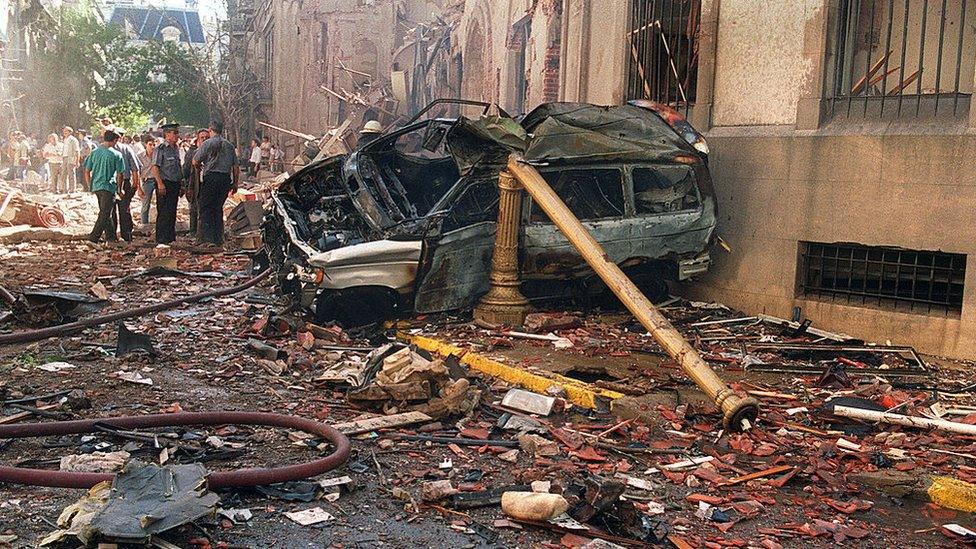
Menem led Argentina when there was deadly attack on the Israeli embassy and two years later, when a Jewish cultural centre was bombed
The mystery of his son's death continued to grip the nation. Menem maintained for years that it had been an accident but latterly accused the Lebanese Shia Islamist group, Hezbollah of carrying out an assassination.
Hezbollah was under investigation after prosecutors accused it of carrying out a deadly bomb attack against a Jewish cultural centre in Buenos Aires in 1994.
The attack left 85 dead, there were newspaper reports in the US that Menem had taken millions from Iranian intelligence to cover things up. In 2015, he faced charges relating to these allegations but was cleared in 2019.
In 2017, the body Carlitos' grave was finally exhumed. DNA tests showed it was that of Carlitos and had not been replaced as his first wife had suggested.
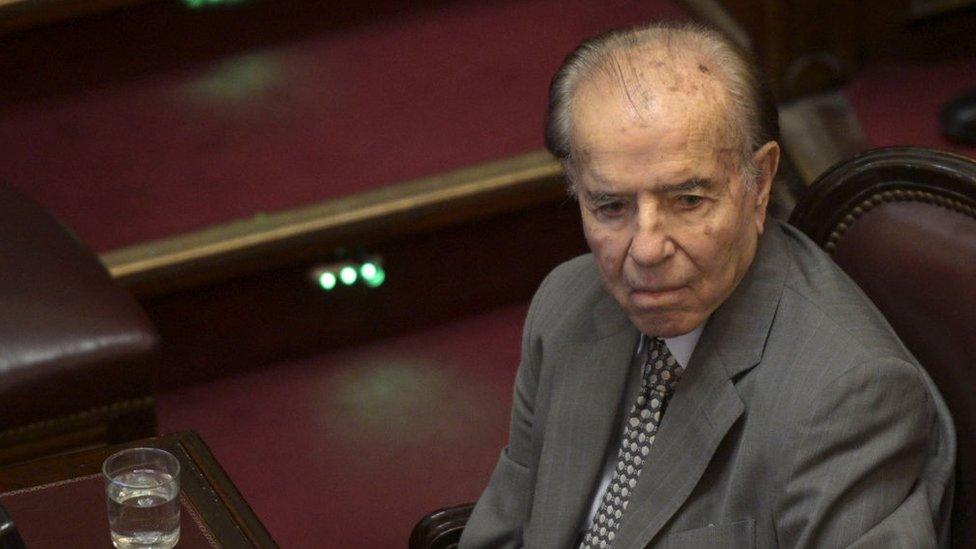
Senator Menem overcame an intensive care stint with pneumonia in 2020
To the end, Carlos Menem was one of the great survivors of Latin American politics.
He was the Peronist disciple who rejected his hero's protectionist economic policies in favour of the hair-shirt approach of the IMF.
He was the president who many blamed for his country's economic collapse in 2001 and the man who controversially pardoned Galtieri and his military cronies in the interests of a peaceful transition to democracy.
But perhaps he will best remembered as the louche, playboy president who spent his final years fending off a prison sentence for corruption while at constant war with his first wife over the circumstances surrounding the death of their son.